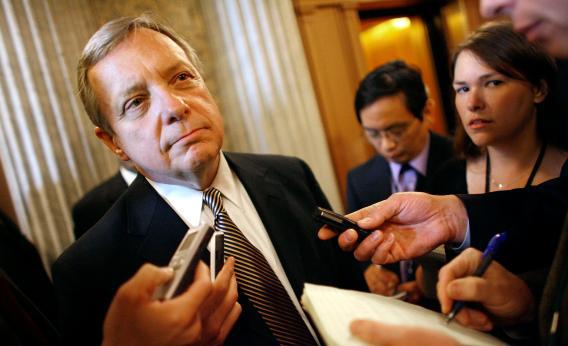Illinois senator and No. 2 Democrat Dick Durbin speaking today at the Center for American Progress offered a mostly upbeat talk on the prospects for a fiscal cliff deal but left one huge fly in the ointment—debt ceiling.
Durbin, as befitting a veteran of various Senate “gangs,” spoke at CAP less to rally the progressive faithful than to try to persuade them that if Republicans can be made to give ground on tax revenue that liberals should embrace a grand bargain. Key points were about the evils of the fiscal cliff, the desirability of strengthening entitlements with reform, the possibility of sheltering infrastructure from spending cuts, and the need for a fair share from revenue. Durbin emphasized the potential pliability of many of his Senate Republican counterparts rather than the intransigence of the House Republicans who are actually key to a deal.
And then came a crucial question from Suzy Khimm—would a grand bargain also have to address the debt ceiling?
Durbin didn’t offer a snappy response like “yes” but what he offered was a long-winded and not-very-quotable way of saying yes. That’s in stark contrast to the stance of House Speaker John Boehner who emphasized today that “there is a price for everything,” including a lifting of the debt ceiling.
This isn’t a subtle difference. The debt ceiling has long been an opportunity for some hypocritical posturing, but last year House Republicans weaponized it. And now it’s the most dangerous object in the American economy and far too potent for any party leader to simply forget it’s out there. A “fiscal cliff” deal that deals with the debt ceiling in a big way—ideally by totally scrapping it—would accomplish something important that’s unrelated to weird obsessions about the long-term budget. But a “fiscal cliff” deal that doesn’t address the debt ceiling is basically worthless. Far from averting a crisis, it would simply lay the groundwork for a new crisis after having exhausted party bases appetite for compromise.
Ideally before wasting a ton of time negotiating the content of a fiscal cliff deal, legislators would talk about its scope. Whether the bargaining includes the debt ceiling or not is crucial, and leaving it out there as a footnote to be decided later is very misleading.
